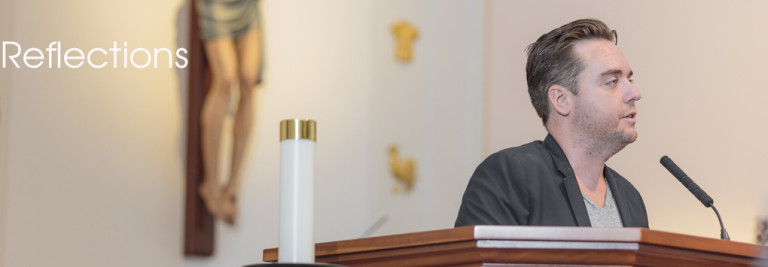Recently, I was driving with someone who is very close to me and was taken aback when that person felt so wronged by a fellow traveler and exploded into a road-raged spout of cursing and anger. (I can assure you the person I was driving with is the least anger-filled person I know, whose disposition is always vicarious.) Instead of nursing the victim, I selfishly turned the conversation to my concerns and me. “What if someone saw me?” “What if your car had an OLMC magnet on it?” “You have to be an example!”
Now, I know that my traveling companion was stressed, overworked and grieving, but the person who was the recipient of their tirade had no idea of any of those things — it was just an unassuming driver who now has some very clear assumptions about my companion. I’m not excusing the tirade, but I hope both parties could stop and try and think of the other.
I bring this up because while reading Matthew Desmond’s amazing new book, Evicted: Poverty and Profit in the American City, I was struck by how we judge the poor in this country. The book is about the big business around the exploitation of poor people. Mentioning payday loans, for-profit colleges, credit card companies, loan shares, and pay-to-own furniture purveyors, Desmond argues that before we judge the choices poor people make, there are unseen forces informing that choice that are often unbeknownst to the person we’re likely to judge. The poor often make choices based on pleasure, often to escape or just to feel less of the shame that poverty gives. Purchasing expensive sneakers for their children or a dinner out can ease the anxiety and post-traumatic stress that financially afflicted people encounter daily. As one eviction survivor put it, they “tried to survive in color, to season the suffering with pleasure” (New York Times, February 28, 2016). That “pleasure” is often destructive and can lead to drug or alcohol abuse which, as I’ve written about before, should be addressed through compassion, not harassment. The choices other people make seem so easy to criticize—certainly easier than our own choices—but we must not judge. That’s not to say that by not judging we’re excusing. I’m not suggesting that either. Bad choices are around us all the time—we make them—but it is important to know what informs those choices.
I live behind a bodega where 40 ounces of beer costs $1.60. That same amount in water is $3.00. Having been evicted in my life I can tell you that not picking up the 40 ounces of beer is a lot more difficult than one might think. Can we criticize people’s choices if the choices are so unequally weighed? In Hackensack there are a half dozen fast food sellers where for the price of one salad I can buy four hamburgers. If I’m feeding my family, is it still a bad choice to purchase the unhealthier hamburgers? Is it choice at all? Desmond continues, “No moral code or ethical principle,” he writes, “no piece of scripture or holy teaching, can be summoned to defend what we have allowed our country to become.” That’s flamethrower language, though in this season of elections maybe we need a flamethrower to cut through the tangled brush of what passes for political discourse these days. Maybe I need to stop judging my friend for the outburst and understand that empathy and selflessness requires patience and takes work. Let’s get cracking.
I’ll be seeing you,
Elliot



